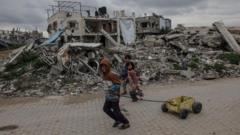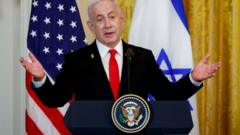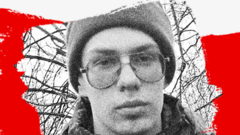As the ceasefire agreement between Hamas and Israel approaches its end, tensions rise over Israel's delay in releasing Palestinian prisoners. Hamas threatens to halt discussions for extending the ceasefire unless the terms are met, leading to warnings from international mediators about the possible resumption of hostilities.
Hamas Demands Release of Palestinian Prisoners as Ceasefire Talks Stalemate

Hamas Demands Release of Palestinian Prisoners as Ceasefire Talks Stalemate
The ongoing negotiations for a Gaza ceasefire are deteriorating as Hamas insists that no further discussions can take place until Israel fulfills its commitment to release Palestinian prisoners.
The article text:
Hamas has claimed that any continuation of ceasefire discussions with Israel is contingent upon the release of Palestinian prisoners as previously agreed. Israel announced on Sunday its decision to postpone the release of over 600 Palestinians, asserting it was in response to Hamas' incessant violations of the terms, which they described as "humiliating" handover ceremonies of hostages.
A senior Hamas official expressed concern that Israel’s failure to follow through on the arrangement puts the entire ceasefire agreement in jeopardy. The official urged mediators, particularly the United States, to apply pressure on Israel to ensure compliance, as the initial phase of the ceasefire, lasting six weeks, is soon set to expire with no discussions for the second phase having commenced.
UN Secretary-General António Guterres cautioned that the ceasefire remains "precarious" and reiterated the importance of preventing a return to hostilities. He also advocated for the "dignified release of all remaining hostages."
On the last day of the sixth week of the ceasefire, Hamas had released six living Israeli hostages, who were received during ceremonies often criticized for their dramatic nature. In a recent incident, Hamas shared a video showing hostages appealing to Israeli Prime Minister Benjamin Netanyahu for their release. In Israel, there was significant outrage surrounding the return of deceased hostages earlier in the week, and allegations arose that the handling of hostages had been mishandled by Hamas.
Scheduled for release were 620 Palestinian prisoners in exchange for the hostages, but the Israeli administration suspended the transfer after Netanyahu's consultations with his ministers. His office cited recurring violations by Hamas during handover events as justification for the delay, stating no further actions would be taken without assurances regarding the release of the next hostages.
In response, Hamas condemned Israel’s decision as a violation of their agreement and declared it could not engage in any further negotiations unless the prisoners were released. Hamas political bureau member Basem Naim warned of possible escalations, insinuating that Netanyahu seemed to be deliberately sabotaging the ceasefire deal.
The White House supported Israel’s decision, labeling it an appropriate action against Hamas's treatment of the hostages. Meanwhile, former President Donald Trump's Middle East envoy, Steve Witkoff, announced intentions to visit the region to negotiate the extension of the ceasefire.
Under the agreed framework, 33 Israeli hostages are expected to be exchanged for about 1,900 Palestinian prisoners. To date, 25 living hostages and several deceased ones have been exchanged, while efforts are ongoing to facilitate the release of others and ensure a full withdrawal of Israeli forces from Gaza.
Since the onset of the conflict resulting from a major assault by Hamas on 7 October 2023, wherein 1,200 individuals were reported killed, the repercussions have been dire. The death toll in Gaza has exceeded 48,346, with a significant portion of the population repeatedly displaced amid widespread destruction of infrastructure and severe shortages of essential resources.
Hamas has claimed that any continuation of ceasefire discussions with Israel is contingent upon the release of Palestinian prisoners as previously agreed. Israel announced on Sunday its decision to postpone the release of over 600 Palestinians, asserting it was in response to Hamas' incessant violations of the terms, which they described as "humiliating" handover ceremonies of hostages.
A senior Hamas official expressed concern that Israel’s failure to follow through on the arrangement puts the entire ceasefire agreement in jeopardy. The official urged mediators, particularly the United States, to apply pressure on Israel to ensure compliance, as the initial phase of the ceasefire, lasting six weeks, is soon set to expire with no discussions for the second phase having commenced.
UN Secretary-General António Guterres cautioned that the ceasefire remains "precarious" and reiterated the importance of preventing a return to hostilities. He also advocated for the "dignified release of all remaining hostages."
On the last day of the sixth week of the ceasefire, Hamas had released six living Israeli hostages, who were received during ceremonies often criticized for their dramatic nature. In a recent incident, Hamas shared a video showing hostages appealing to Israeli Prime Minister Benjamin Netanyahu for their release. In Israel, there was significant outrage surrounding the return of deceased hostages earlier in the week, and allegations arose that the handling of hostages had been mishandled by Hamas.
Scheduled for release were 620 Palestinian prisoners in exchange for the hostages, but the Israeli administration suspended the transfer after Netanyahu's consultations with his ministers. His office cited recurring violations by Hamas during handover events as justification for the delay, stating no further actions would be taken without assurances regarding the release of the next hostages.
In response, Hamas condemned Israel’s decision as a violation of their agreement and declared it could not engage in any further negotiations unless the prisoners were released. Hamas political bureau member Basem Naim warned of possible escalations, insinuating that Netanyahu seemed to be deliberately sabotaging the ceasefire deal.
The White House supported Israel’s decision, labeling it an appropriate action against Hamas's treatment of the hostages. Meanwhile, former President Donald Trump's Middle East envoy, Steve Witkoff, announced intentions to visit the region to negotiate the extension of the ceasefire.
Under the agreed framework, 33 Israeli hostages are expected to be exchanged for about 1,900 Palestinian prisoners. To date, 25 living hostages and several deceased ones have been exchanged, while efforts are ongoing to facilitate the release of others and ensure a full withdrawal of Israeli forces from Gaza.
Since the onset of the conflict resulting from a major assault by Hamas on 7 October 2023, wherein 1,200 individuals were reported killed, the repercussions have been dire. The death toll in Gaza has exceeded 48,346, with a significant portion of the population repeatedly displaced amid widespread destruction of infrastructure and severe shortages of essential resources.



















